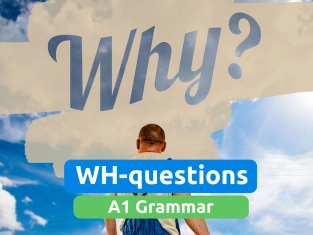by PushtoLearn
Question Forms
Table of Contents
- Question form exercises
- General Questions (Yes/No questions to give a straight answer)
- Wh-questions (also we can call them Special Questions)
- Subject questions
- Alternative questions (when you ask people to make a choice)
- Tag questions
- Negative questions
- Indirect questions (use them for polite questions)
- Question forms with different verb tenses
- Common mistakes in question formation
Question form exercises
Let's start with question formation exercises to focus on asking questions.
General Questions (Yes/No questions to give a straight answer)
These are questions that need only a short answer: yes or no.
We often use them with the verb be, with do/does/did, or with modal verbs (can, will, should, may, etc.).
Examples:
-
She is a student. → Is she a student? → Yes, she is. / No, she isn’t.
-
You like football. → Do you like football? → Yes, I do. / No, I don’t.
-
They can swim. → Can they swim? → Yes, they can. / No, they can’t.
Notice that in these questions, the verb comes before the subject.

Wh-questions (also we can call them Special Questions)
These questions begin with a question word. The most common question words are:
-
What
-
Who
-
When
-
Where
-
Why
-
Which
-
Whose
-
How
Wh-questions ask for more information. They do not take just yes or no as an answer.
Examples:
-
What is your name? → My name is Anna.
-
Where do you live? → I live in London.
-
When is your birthday? → My birthday is in May.
-
Who is your teacher? → My teacher is Mr Smith.
-
Why are you sad? → Because I lost my book.
Subject questions
In most questions, we ask about the object or about other parts of the sentence. But sometimes the answer is the subject of the sentence. These are called subject questions.
The important point is that the word order does not change. The question has the same order as a normal sentence.
Examples:
-
Sarah spoke to Mike. → Who spoke to Mike? → Sarah did.
-
Music makes me happy. → What makes you happy? → Music does.
Compare:
-
Who did Mike speak to? → He spoke to Sarah. (object question)
-
Who spoke to Mike? → Sarah spoke to Mike. (subject question)
Alternative questions (when you ask people to make a choice)
These questions give a choice between two or more things. We use the word or in the question.
Examples:
-
Do you want tea or coffee? → I want tea.
-
Are we leaving today or tomorrow? → Tomorrow.
-
Which colour do you prefer, red or blue? → Red.
We can also make this type by adding or not at the end. For example:
-
Are you coming or not?
-
Do you like it or not?
This form is more direct. Sometimes it sounds a little impatient.
Tag questions
A tag question is a statement plus a short question at the end. We use tag questions to check information or to invite agreement.
The rule is:
-
A positive statement takes a negative tag.
-
A negative statement takes a positive tag.
Examples:
-
It is a nice day, isn’t it? → Yes, it is.
-
You don’t like fish, do you? → No, I don’t.
This form is very common in everyday conversation. It helps to keep the conversation going.
Negative questions
A negative question is a question with not (or n’t). We often use negative questions to show surprise, to complain, or to check information.
Examples:
-
Don’t you like apples? → Yes, I do. / No, I don’t.
-
Isn’t he at school? → Yes, he is. / No, he isn’t.
-
Wouldn’t you like a cup of tea? → Yes, I would.
Indirect questions (use them for polite questions)
Indirect questions are more polite. We often use them with strangers or when we want to sound formal.
We start with an expression such as:
-
Can you tell me…
-
Do you know…
-
I wonder…
After this, the word order is the same as in a normal sentence. We do not use inversion.
Examples:
-
Where is the bank? (direct question)
-
Can you tell me where the bank is? (indirect question)
-
Is she at home? (direct question)
-
Do you know if she is at home? (indirect question)
Indirect questions are especially common in polite requests.
Question forms with different verb tenses
|
Tense |
Affirmative |
Yes/No question |
Wh- question |
|
She likes tea. |
Does she like tea? |
What does she like? |
|
|
They left early. |
Did they leave early? |
When did they leave? |
|
|
He is studying. |
Is he studying? |
What is he studying? |
|
|
They were watching TV. |
Were they watching TV? |
What were they watching? |
|
|
She has finished her work. |
Has she finished her work? |
What has she finished? |
|
|
She will visit us. |
Will she visit us? |
When will she visit us? |
Common mistakes in question formation
|
❌ Incorrect |
✅ Correct |
Why? |
|
You like coffee? |
Do you like coffee? |
Use do/does in present simple questions. |
|
Does she goes to school? |
Does she go to school? |
After "does," use base verb. |
|
Where you are going? |
Where are you going? |
Use verb before subject in wh- questions. |
|
Did she went home? |
Did she go home? |
After "did," use base verb. |
To get more practice about questions - have a look at similar topics: Question Mark, Question Words, Indirect Questions.

